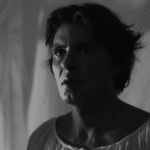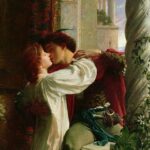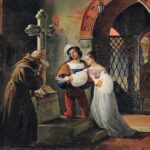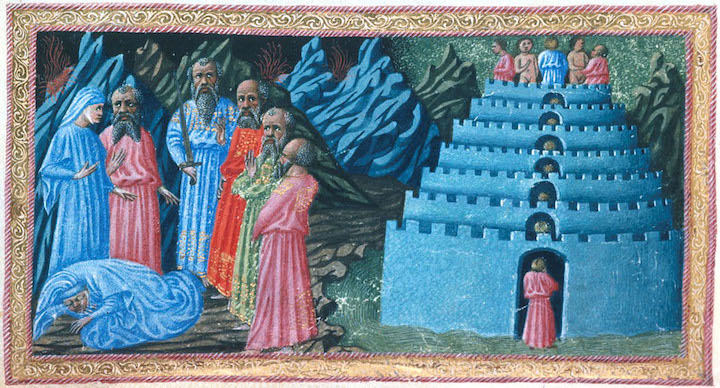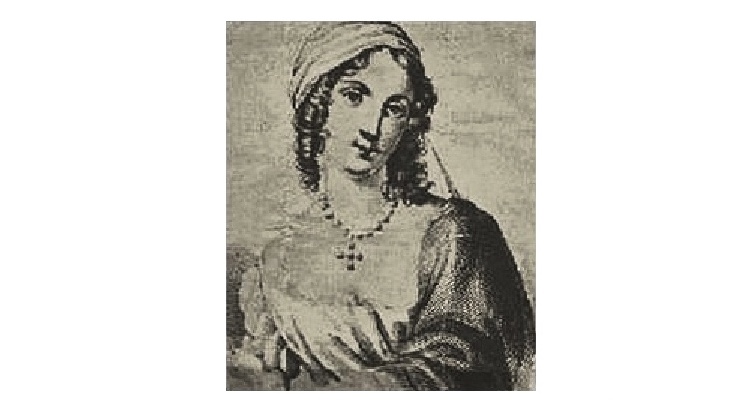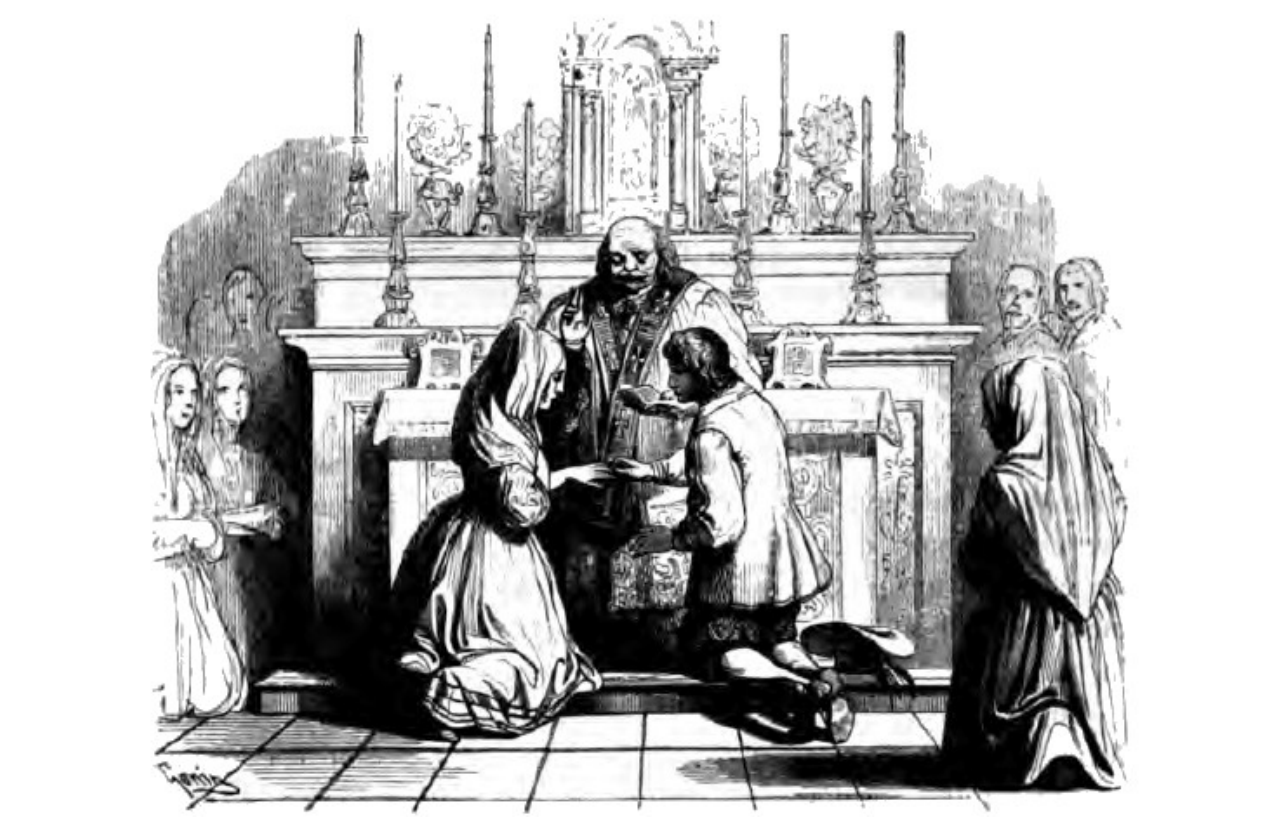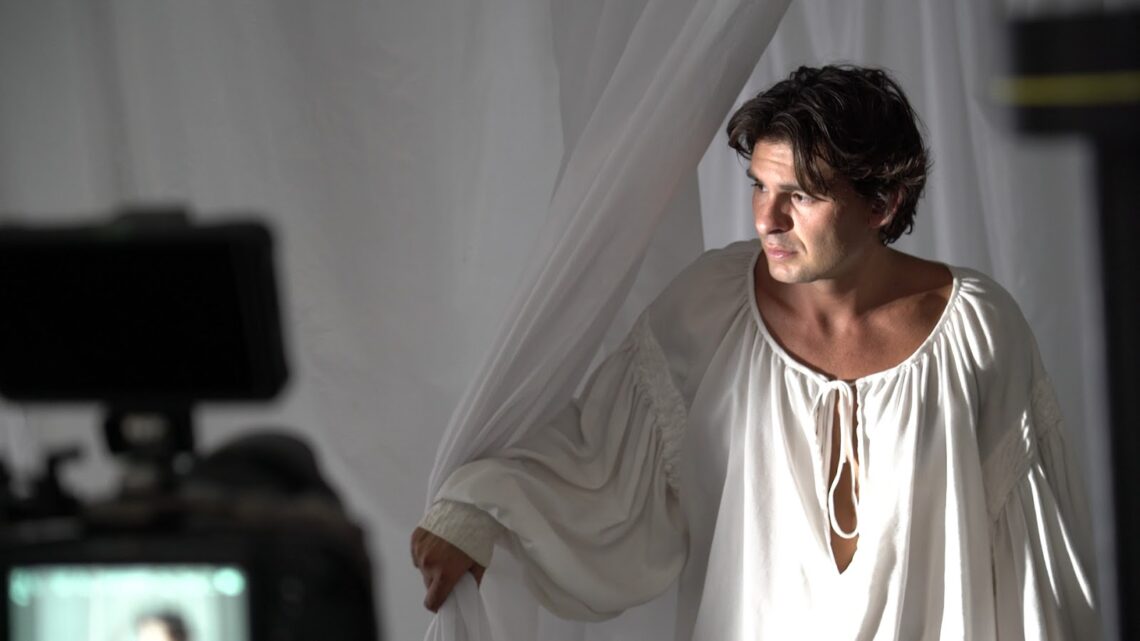
Behind the scenes interview: Juliet is dead: Romeo’s Lost Scene
In the video below, director filmmaker Rhianna Spooner and author/translator Michael Curtotti talk about Juliet is Dead: Romeo’s Lost Scene: the new release short film dramatising a lost scene from the Romeo and Juliet story. That scene never made it into Shakespeare’s play. The video includes behind the scenes footage from the film shoot with J.K Kazzi and Gabriel Alvarado.
An edited interview transcript (not including the behind the scenes footage in the video) is provided below.
Introduction
Hi, my name’s David Curry. I’m coming to you from Ngunnawal and Ngamberri country, Canberra. I’m very excited to be part of this launch of Juliet is Dead: Romeo’s Lost Scene.
So as we’ve described in the media release, this is a world first, where a creative team made up of some of Australia’s rising film and acting talent have brought to life the climactic moment where Romeo first hears the news that his lover Juliet is dead. So yes it’s Romeo and Juliet, but not as you may know it.
In fact what we’ll hear from Romeo is not in Shakespeare’s play. It’s a scene from Romeo and Giulietta, a novella by an Italian monk called Matteo Bandello. The novella was published in the mid-16th century, quite some years before Shakespeare adapted the story for what’s become arguably the world’s most famous tragic romance.
I have with me Michael Curtotti, Canberra lawyer and writer who’s given us a fresh modern translation of Bandello’s novella. The novella is the source for what we’ll hear from Romeo in this lost scene and arguably for Shakespeare’s play, as we’ll discuss shortly. I’m also very excited to have with us, Sydney based film director Rhianna Spooner. Rhianna felt a connection with Michael’s translation. It inspired her to bring Romeo’s lost scene to life in what I think is a quite stunning performance and short film titled Juliet is Dead: Romeo’s Lost Scene. Welcome to you both.
Thank you Dave.
So Michael, this is a scene that people who only know Shakespeare’s version, which is most people I guess, have never seen. Having translated the story, what’s it like seeing the words brought to life and represented by the actors in this way?
Dave, thanks for hosting this interview today. It’s wonderful you’re doing this with us and we’re able to share this together. I really want to congratulate Rhianna and her team for what they’ve produced with this amazing film. It’s beyond what I could have imagined or did imagine for the scene. The way the actors responded to it, how Rhianna has directed it, the CGI that Jack has brought to it which puts you literally in Mantua. It’s all amazing. So I’m just amazed at how this story has moved forward to this new level in this film production.
As you saw I was lucky enough to be able to attend the filming. It’s an experience that will stay with me forever. I’ve been working with Bandello’s story now for more than a year. In a way, Romeo and Juliet – they aren’t just characters for me anymore. It’s almost like they’re real people. People who have gone through real experiences. So yea its wonderful.
Rhianna, I might ask you now a question. So Michael approached you about filming Romeo’s missing scene you surely would have already known about Shakespeare’s play. Can you talk a bit about your reaction to Bandello’s version and why you decided to take it on?
Sure and thanks Dave and Michael for having me on today. I’m a film director now, but a decade ago I was doing theatre. I even played Juliet. So I know Shakespeare’s version back to front. I was always really intrigued by the specificity of Italy and Verona and Mantua. It just went beyond what could have been Shakespeare’s imagination.
So when Michael shared Bandello’s version with me it felt like kind of the missing piece in the jigsaw puzzle. I was really excited to take on Bandello’s version because it’s not well known. So there’s lots to discover. Also, it doesn’t carry, the weight that Shakespeare’s does, with 500 years of theatre tradition or everyone’s bad memories in high school English.
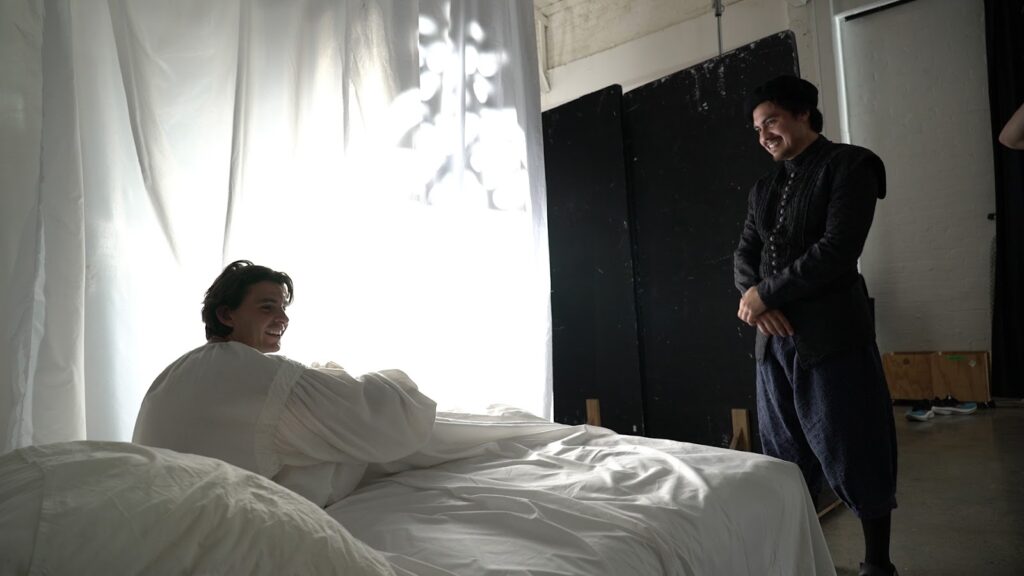
Do you think this version of the story is relevant to young people today? Do feel that?
Rhianna: Yes. Romeo and Juliet will always attract young audiences. This particular Bandello’s version is written in prose rather than verse. So his language has a simplicity. Also there is an elegance to it that has aged really well.
The characters express themselves with a directness that removes some of the distance of history that Shakespeare’s version has. I think also Shakespeare’s characters are driven by passion. They act impulsively and they leap into everything. Bandello writing a novella, gives his characters time to agonise over their decisions. We spend time in their predicaments and to me it makes them far more relatable. It also makes their inevitable downfall a lot more tragic.
Michael let’s better understand the source of what we’re seeing here today. So can you talk a little bit about who was Matteo Bandello? Where does Romeo and Giulietta to fit into his work? How do we get from his novella to Shakespeare’s later play?
Sure thanks Dave, so Matteo Bandello was an Italian monk or friar. He lived in the 16th century as we’ve heard, but being a monk was really just his day job. His passion was writing and he was connected with the court in Mantua. A little bit later in his life, he was still a young man, war forced him to leave his home. Eventually he was forced to become a refugee in France and he later became a bishop there.
He’d been a writer most of his life but it wasn’t really until the end of his life that his major work was released. His major work was a collection of short stories or novellas. It’s in this collection that we find the Romeo and Juliet story. The important thing about that, and he wasn’t the first one to write a version of Romeo and Juliet, it’s important to acknowledge, was that his version was the version that made it out of Italy.
In a way, he writes his stories as, by then, an old man living in France as an exile, as his memories of the beautiful world he left behind in Italy. It comes through in the preambles he writes and also in the way he writes the stories.
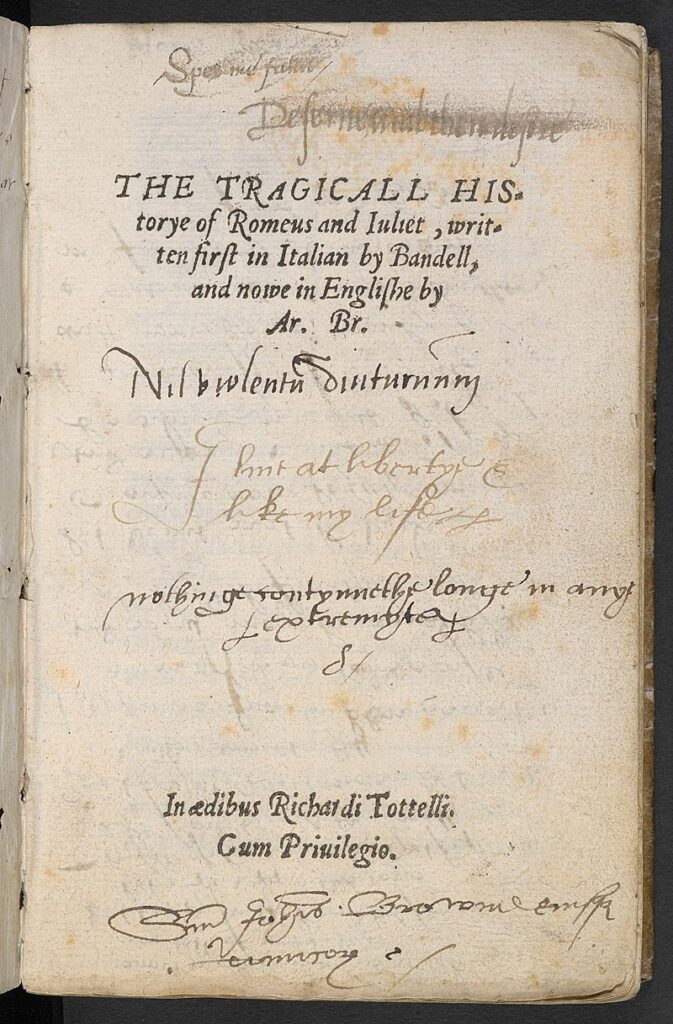
So this is the short version of how the story gets to England. Pretty soon after he published his novellas, they’re translated into French. Then from French, in 1562, a young man called Arthur Brooke translated the Romeo and Juliet story into English. It’s the first known English translation.
An interesting aspect, is that he was inspired to make that written translation after seeing a Romeo and Juliet play performed in England in 1562. This is very early. Shakespeare wasn’t even born then. By the time we have a printed version of Shakespeare’s Romeo and Juliet play, the lovers Romeo and Juliet were famous in English literature.
So we know that Shakespeare mainly drew on the Arthur Brooke version that I’ve mentioned but in working with Bandello’s text I’ve come to the view that Shakespeare must also have read Bandello’s original Italian. There’s a few places in the Shakespeare version where you find evidence of that and I’ve written about that in the introduction and afterword to my translation.
Thanks Michael, so we’re referring to this as the lost Romeo scene because for whatever reason Shakespeare chose not to include it in his play. What do you think the scene does for the story in the context of Bandello’s novella?
I think it’s a shame. It’s a terrible shame that the scene was lost. I think it’s an important part of the story. We see Romeo as he is. We see his feelings. He shows us his inner life in that scene – his love for Juliet, his terrible feelings of guilt and heartbreak which are killing him. So the scene is about mental health as we saw in the BTS. It’s about his grief. It’s a much truer or more real representation of the scene than we find in Shakespeare, where we don’t see any of Romeo’s inner life at all.
Rhianna, I might come back to you now. So as we saw in the behind the scenes footage, you shot this film in a studio in Sydney. I’d love to know a bit more about some of the creative decisions you made in deciding exactly how to film this scene and perhaps the challenges of creating a Renaissance Italy in the middle of Sydney?
Firstly, I’ll just say, film is a team effort. I’m very grateful to my Afters Crew that supported me in pulling it all together. Also like most things in the arts, this was a passion project so we had limited resources. Thankfully, Studio Mondo provided us with the studio space and the gear. Then we also had props and costumes provided very generously by Sydney Theatre Company.
But I guess back to the creative decisions. When Michael, when you, first approached me you were after just a simple theatrical monologue against a black curtain backdrop. I had bigger ideas. I think to me when I was reading the translation, the difference between Bandello and Shakespeare is that one is an author and one is a playwright. So I really wanted to be authentic to Bandello’s own style of storytelling which is full of imagery and locations that he knew intimately and very passionately from his childhood. So it it definitely made sense to me to make it cinematically.
Another choice I made was to make it black and white. Historically Italy during the Renaissance would have been very very vibrant but the scene itself is about mental health. It’s about Romeo’s internal thoughts and dealing with issues of suicide. So it just felt like the right choice to align us with his internal life. Then in terms of bringing Italy to Sydney, I worked very closely with the cinematographer and VX artist Jack McGrath. He has the combination of on set and post production skills that meant we could really strategically plan how to combine practical effects. So, for example the window frame that we built, with CGI elements – like the green screen for the exterior windows.
So it was it was a challenge but it was fun because it meant we could push ourselves and explore new technology as well.
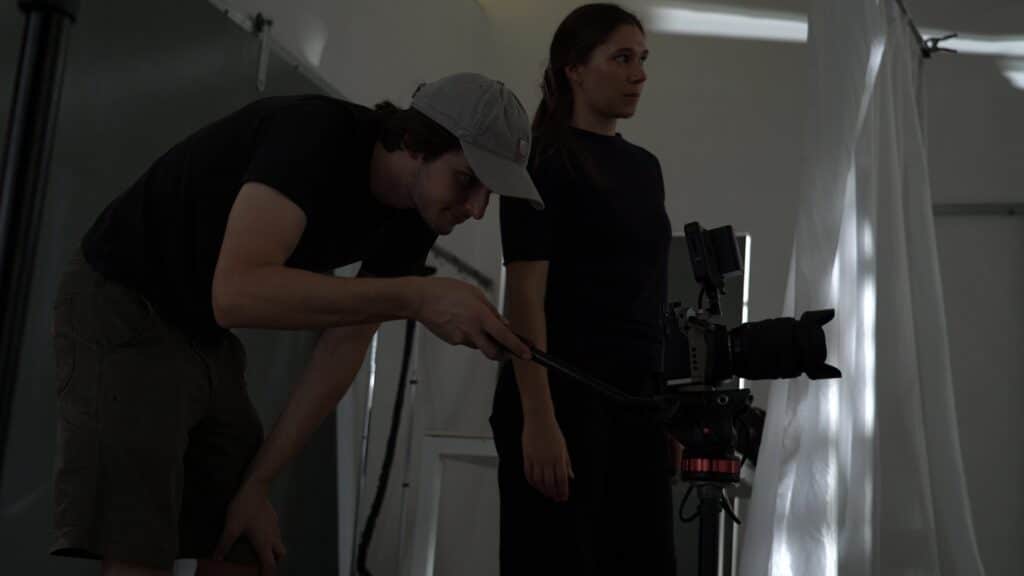
Terrific and I think it’s a fantastic result. You recruited actor JK Kazzi to play Romeo and he’s supported by Gabriel Alvarado playing Balthasar. Both recent NIDA graduates. I mean we saw them working through some of the some of the issues in the behind the scenes footage. Can you talk a little bit about what you were going for from them and how the actors actually reacted to Michael’s translation?
On a practical side I knew we needed to shoot the scene; rehearse and shoot the scene all in a single day. So, for Romeo I wanted an actor that had that drama school training, that kind of rigor behind them that meant they could access the darker emotions safely and professionally and efficiently.
Then, I don’t really feel the need to audition actors anymore. Instead I try to have a conversation with them and work out if they’re a genuine person. I’d had a chat with JK Kazzi, who plays Romeo and and does an amazing job, at a mixer event right after he graduated. I remember his peers were all talking to me about themselves and the roles they wanted to play. Whereas JK was talking about his favorite filmmakers and what writing we were into. So he had this massive passion that was clearly coming from the right place. So it was it a no-brainer for me to cast him and then casting Gabriel Alvarado as Balthasar in the scene.
It’s funny. I had like a gut feeling that Gabriel would bring the right sort of big brother Balthasar energy that JK needed to get through the scene. Then later, after I cast them and brought them both together, I found out that they were actually best friends in real life. When JK started at NIDA, Gabriel was in his final year so the relationship we see on screen really is like their real relationship in real life.
Then I guess when it came to showing them Michael’s translation I suspected the actors, because they have such a massive respect for the craft, and they work so hard, they would feel a bit of pressure doing Romeo and Juliet. So I didn’t want them to get too in their heads about it and I deliberately didn’t show them the translation until a few days before. The purpose of that was to give them permission to trust their instincts and let loose on set. So when they did read Michael’s translation they were nervous but they were very excited. They said to me that when you’ve got language like that, which is so personal and emotional, it’s a gift and they they felt very safe and in good hands.
Rhianna, I wasn’t actually there for the filming but I understand that particularly JK Kazzi was actually quite deeply affected by the mood of what he was saying and and the themes?
Yes, he, like all of us, was moved by the story. He was immersed in the character and that’s why I was really excited to bring Gabriel in as Balthasar, so that he had that chemistry and he felt safe to go there into those emotions and be looked after. You can see in the BTS footage they they have this great chemistry. They’re both there giving each other hugs and helping each other through it.
Michael back to you. What do we know about what Shakespeare took from Bandello’s novella and what he left out?
Before I come to that, as we’ve been talking about JK and Gabriel, I just want to acknowledge the wonderful job they did in representing Romeo and Balthasar. Just beautiful. They’re so talented; beautiful acting. Very heartfelt and it was humbling to see how many times they had to go into character to to be able to represent that … The short film we have, they were doing that many many times. It’s a testament to their skill as actors that they were able to do that.
So Shakespeare – what did he take from the novella? I think it’s important to realise that it isn’t Shakespeare’s story in a sense. Shakespeare is of course an amazing dramatist. He’s an amazing poet, but his typical workflow was that he would find a story or he would find a historical account and he would use that raw material as the basis for a play. He would adapt that material to the stage. There was nothing unusual about that in his era. Many were doing that. He did that with Romeo and Juliet. In fact almost the entire plot comes from Bandello’s version of the story, although there are quite a few plot differences which I won’t give away today.
One of the things that’s different between the versions is the language that’s used to represent the story. I think we’ve been touching on that. Shakespeare tends to use poetry. He uses word play a lot. He introduces comedy which adds another dimension to the story, but also distracts a little from the darkness and really the anguish of the tale. Mercutio, Shakespeare develops into a much fuller character. So, you see there are differences like this.
Bandello’s writing style is very different. He takes us into the thoughts and feelings of the characters. Juliet is a much stronger character in his version and that’s a wonderful dimension of it. She’s really the brains of the operation and we see that much more clearly in how Bandello’s writes the story.
In translating the novella from from Italian to English for a new generation you really had to get inside the language – every sentence and the meaning within. So can you talk a little bit about what what impressed you most about Bandello’s language and the themes?
Well again we’ve touched on how Bandello’s language has aged well. It is a lot more accessible to a modern audience than Shakespeare’s language. I think a major reason for that is the Italian language hasn’t changed as much in the last 500 years as English has. There have been major changes since Shakespeare’s time.
Also I think Bandello had a profound understanding of people and maybe that came from his work as a friar. In the story we see a friar in confession. That probably happened a lot in his life. So his characters are real people. They’re people you might meet today. Their feelings are the feelings that people feel today.
The other thing about his writing is his language has a beauty to it and also a deep emotiveness. The words he chooses brings out the emotion of the story are part of the Italianness in how he writes. One of the things that was important to me as a translator was to try to capture that depth of feeling in how I represented his story in English words.
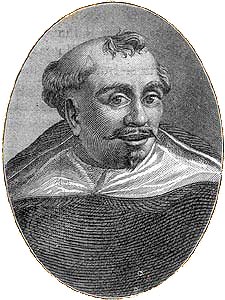
Thanks Michael. So Rhianna, the scene you shot focused on Romeo and we only briefly see Juliet. Having read the novella what do you think it adds to our understanding of Juliet and the challenges she faces?
I think like Michael was saying before, Juliet is a much stronger character in Bandello’s version. She’s eighteen rather than fourteen as Shakespeare had her. She’s just much more complex. She considers the political advantages of marrying Romeo. She talks about how it may bring peace to their houses. So she’s not just swooning for Romeo. She’s crafty. She’s determined. She’s calculating. At one point she even considers dressing as a man to escape Verona.
Are there any other scenes that you’d be interested in shooting from the novella?
Rhianna: Yes, I think so. So we shot Romeo’s lost scene but to me it’s Juliet’s lost story. I would very much like to shoot the whole thing one day.
Conclusion
David: Well that’s something exciting to look forward to. So, I want to thank Rhianna and Michael for those great insights into how you approached the lost Romeo scene from your respective creative fields.
I think it’s very exciting and having been on this journey with Michael as friends for quite some time. I think I was no less excited than Michael to see this come to life in your hands Rhianna, so it’s fantastic result.
So congratulations I think on everybody’s very fine works: Michael’s really fresh translation of the novella, your film making skills Rhianna and the amazing performances as we see from the actors. Congratulations to everybody.
So for those watching I’d just say if you have even only a passing interest in Shakespeare and Romeo and Juliet I encourage you to watch the film: Juliet is Dead: Romeo’s Lost Scene, and also search out Michael’s translation.
So thank you very much everybody.
Michael and Rhianna: Thank you. Thank you.


